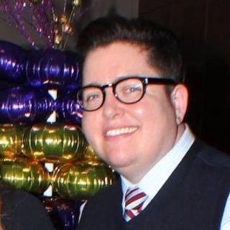A Conversation about Transgender Issues, and the Courage to Change with Henry Francis Doyle

#RealLiveTransAdult
“Although social acceptance for transgender people is growing, parents continue to abandon youth with gender-identity issues when their children need them most, advocates say. 49 percent of transgender people attempt suicide. Transgender youth account for 18 percent of homeless people in cities such as Chicago, but researchers estimate fewer than 1 in 1,000 people is transgender. 1 in 12 transgender people in America is murdered.”
Henry Francis Doyle grew up knowing that he was transgender but did not make the choice to medically transition until 37. “Part of the reason it took me so long to make that decision to medically transition, was there was a lack of information, a lack of evidence-based medicine, and there was just a lot of fear and change on my part about everyone in my life know who I was.”
Henry had been telling people he was trans since about 17 but did not yet realize a medical change was possible. In college, Henry felt more comfortable talking with classmates about feeling more male. He began to realize that care and love surpasses gender. That love doesn’t necessarily see gender.
“When I finally came out to my family, my world broke open.” Henry wrote a letter to tell his family how he felt, but never sent it. He kept it and carried it with him for years. “I had been thinking about how I was actually going to do this and handle this coming out to my family and I just really struggled with it for a long time.”
When Henry decided to seek his family’s blessings for the gender change, a sudden family emergency came up. His mom had a brain aneurysm that burst. Within 12 days, his mom was gone. Henry says that the last days with his mom were graced. “It was shocking, it was sudden, it was also a terrible and beautiful experience.”
Of course, the grief became the focus of the family and the work of the family. Henry’s mom was the only one, of his family, who knew who he was. She asked him not to transition, making the decision even harder. With gender as a foundational piece of identity, feelings that you are being recognized in the wrong way, can feel crazy and unsafe.
The Keys of Henry’s Process of Transition:
• November of 2013- Beginning of Hormone Therapy
• Embracing the Second Adolescence
• Being Surround by a Strong Support System
Each path is unique with different options. After years of binding the breasts and wearing compression garments, Henry is looking forward to life after a double mastectomy. Henry says if he does not wear the compression garments, even after years, he feels that he is in the wrong body. “Every single morning I can point to a moment when I actually begin to ignore my body.”
Violence and harassment often comes from misunderstanding. By bringing understanding we can “share space.”
Trauma and challenges take work and time but create growth.
@rabbittbus #RealLiveTransAdult @mistressoftea http://cbsloc.al/1BgkPao
We want to honor everybody. @rabbittbus #RealLiveTransAdult @mistressoftea http://cbsloc.al/1BgkPao
For more on this topic and resources to learn more, tune into this week’s episode of Change Maker: A Conversation about Transgender Issues, and the Courage to Change with Henry Francis Doyle Join Zhena with her guest Henry Francis Doyle as they discuss LGBTQ issues. The intention of this episode is to lift the veil of ignorance and allow listeners to hear firsthand what issues and challenges a transgender man, Henry faces as he makes his transition. You will be challenged and your eyes will be opened to a new perspective. The goal: compassion, equality and safety for the trans population. http://cbsloc.al/1BgkPao
If you have a friend you think would benefit, share if you care!



